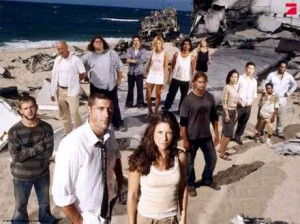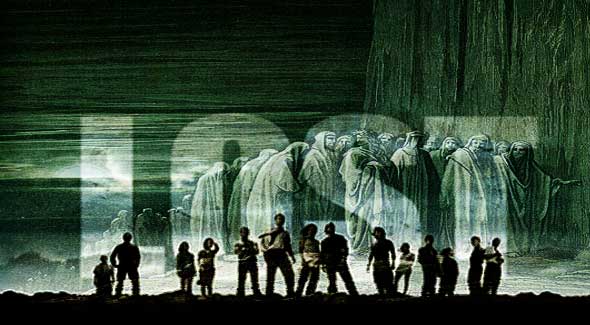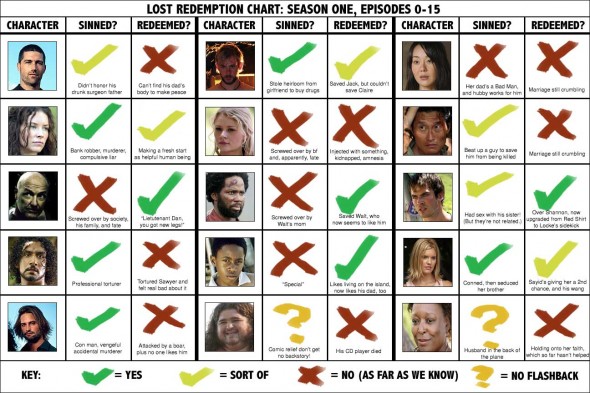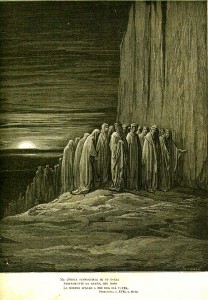This article will cover Lost season 1, episodes 0-15, focusing on episodes 8-15. Please limit your comments to those episodes. Thanks.
 Previously. On Overthinking Lost.
Previously. On Overthinking Lost.
I do remember thinking a little about Lord of the Flies but more particularly that they seemed to be doing a heavy-handed “Redemption” theme. The island gave every character, in some way, what they wanted. (Tom P.)
“No, Tom P!” I said. “I don’t believe you. I’m ‘not quite prepared’ to make that claim, Tom P! I’ll wait until there’s texual evidence, Tom P.”
Ask the Lost writers and ye shall receive. Thus:
Everyone gets a new life on this island. (John Locke)
I just want to go back to the beginning. (Sun)
I just wish I could start over. (Jin)
Everyone gets a new life on this island. I’d like to start now. (Shannon)
Curse you, Tom P! Fine, I give. Maybe… you were right. The characters on Lost seem to be begging for redemption. While they may not be true Lockean blank slates (a.k.a. tabula rasa), they sure want to get clean slates. Yes, “Adam and Eve” are dead on this island, but maybe, just maybe, the once-sinful Lost characters can redeem themselves and reclaim this place as a new paradise. A Total Redemption Island, if you will, where everybody gets a happy ending and learns a good lesson along the way. And I’m sure that’s what’s going to happen in the show. I’m right, aren’t I? …Guys?
…On second thought, I think I’m going a little overboard. Let me be fair to my past self. Lost can’t be renamed Total Redemption Island yet for the simple reason that not everyone has been redeemed. Let’s look at what happened over the course of the last eight episodes:
Episode 8 (“Raised by Another”): In the past, Claire’s baby-daddy wussed out and left, and a fortuneteller tricked her into getting onto the ill-fated Oceanic Air flight that would start our series. In the present, everyone thinks Claire is crazy paranoid, but then she and Charlie get kidnapped by Ethan.
Episode 9 (“All the Best Cowboys Have Daddy Issues”): In the past, Jack got his surgeon dad fired for working while under the influence. In the present, Jack and Kate track down Charlie, and Boone and Locke find a hatch.
Episode 10 (“Whatever the Case May Be”): In the past, Kate conned a bank thief into stealing a safe deposit box for her. In the present, Kate finds a case (Like in the title! Get it?!) that has guns and a toy airplane inside.
Episode 11 (“Hearts and Minds”): In the past, ZOMG BOONE AND SHANNON HAD SEX WITH EACH OTHER. In the present, Boone learns not to want to have sex with his sister anymore. Step-sister. Whatever.
Episode 12 (“Special”): In the past, Michael never gets to see Walt because Walt’s mom is a selfish good for nothing. Then she dies. In the present, Michael builds a raft and saves Walt from a polar bear.
Episode 13 (“Homecoming”): In the past, drug addict Charlie tried to get clean but ending up stealing shit from his rich girlfriend. In the present, Claire comes back, and Charlie kills Ethan.
Episode 14 (“Outlaws”): In the past, Sawyer was tricked into killing a guy who, it turns out, wasn’t the man who screwed over his dead parents. In the present, a boar has it out for Sawyer.
Episode 15 (“In Translation”): In the past, Jin was actually kind of a good guy caught in a bad situation. In the present, Jin fights with Michael, finds out Sun speaks English, and ruins his marriage again. Also, Walt burned down his dad’s raft.
Or, in chart form:
As you can see from the chart, not everyone has been redeemed yet. For some, like Walt and Locke, the island has been a godsend. For others, like Kate and Shannon, it is a chance at a new beginning, but simply a chance. And, for others, especially Sawyer, the island is some kind of karmic hell. A Total Karma Island, if you will.
How can we make sense of Lost’s island as a metaphor if it seems to have different meanings for different people? I’m not sure I can just yet. However, the show’s metaphysical universe seems to make a lot more sense to me when I, like Tom P., conceive of it in terms of redemption. Specifically, Christian redemption. More specifically, the idea of redemption through fire.
Otherwise known as purgatory.
Dante’s Peak.
I’m sure I’m not the only one who has thought of this idea. Think about it: according to Jack’s dad, Australia is called “down under” because it’s literally Hell. In fact, folks in medieval times often conceived of Hell as a literal place in the southern hemisphere. And why not? What did they know? They’d never even heard of Australia back then. Hop a few centuries into the future, and you’ll find that Australia, like Hell, has been settled by criminals. It’s also hot, arid, and full of poisonous snakes. All the characters who go there have an awful, awful time. Don’t get me wrong. I’m sure Australia is a lovely, lovely country. But in Lost, it’s (metaphorical) Hell. Sorry, Aussies.
Heaven, on the other hand, is a place everyone wants to get to. You go up in the sky and finally reach the destination you’ve always been hoping to reach. And there it is…
Los Angeles?!
Yes, friends. In the universe of Lost, Los Angeles (where all the writers live) is Heaven on Earth. Los Angeles is the place everyone wants to get to. The characters all imagine that when they arrive, they’ll immediately know peace. Plus the place is named after angels, which doesn’t really help my argument but doesn’t really hurt it, either.
Take Jack, for instance. He flew to Australia (Hell), where he learned some terrible news (his dad was dead, probably because of him), and he immediately wanted to get out of there. Recall how he begged, practically on hands and knees, the Oceanic teller to let him and his father’s coffin on the flight. In Jack’s mind, he could only escape his psychological Hell if he left Sydney and reached LA, his version of paradise. The same is true for Boone, Shannon, Claire, Michael, Sun, and Jin at least. Unfortunately for them, they only made it halfway between Hell and Heaven. That’s why everyone’s caught in some psychological limbo when they’re on the island. Psychological limbo… or psychological purgatory.
I know, I know. My argument might sound intriguing, but you’re not sold. Fear not, for I have read up on purgatory. Through the powers of Wikipedia, I have reminded myself that, according to Dante, the literary authority on all things purgatory-related, purgatory was imagined in the Middle Ages as a literal place on Earth. According to Dante, that literal place was located exactly opposite from Jerusalem on the globe.
So, I hopped on over to my friendly neighborhood antipodes map to find out what was exactly opposite from Jerusalem on a globe. And, lo and behold, Jerusalem’s antipode is in the middle of the Pacific Ocean, in the southern hemisphere, about 1000 miles south of where you’d imagine a flight from Sydney to L.A. would travel.
Want more evidence? According to Dante, when Satan fell from Heaven, he fell so fast he created a crater on Earth in Israel. It’s called the Dead Sea. His impact was so intense, in fact, that he forced land to rise up on the other side of the Earth. In other words, at Jerusalem’s antipode, Satan created a mountain. And a mountain in the middle of the ocean, you might recall, is called an island.
A motherbleepin’ island!
Bam. Lost is purgatory. Q.E.D.
How does this knowledge help us understand Lost? Well, if the island is purgatory, it means everyone on the island
a) is a sinner, but not such a bad sinner they’d end up in Hell for good,
b) is going to go through some rather hellish “cleansing,” and
c) is ultimately going to be redeemed and get to Heaven. I mean, Los Angeles. Or they’ll have a redemptive death and go to Real Heaven. You know. In the clouds.
If all of this is true, by the end of the series that fancy chart I made is going to be full of green check marks. Except for Locke, who I still maintain is going to turn out to be some version of a Jesus-figure or God-figure, and maybe except for Claire, who is turning into some Virgin Mary/Eve-figure and is possibly pregnant with the Antichrist. Unless Walt is the Antichrist. I’ll have to get back to you on that.
In summary, last week I argued that Lost was a story of reason vs. faith, with reason taking the first round. Now, faith’s clearly making a comeback in a big way. It’s not necessarily Rose’s more Protestant faith (pray and Jesus will give you peace) but a darker, more old-school Catholic faith: if you undergo this purgation, you may eventually be allowed in Heaven. But man, first it will it suuuck.
Next time on Overthinking Lost: What does all this have to do with Australian spiritualism? Why are only five of the seventeen major characters on the island female? How can Naveen Andrews stand being so damn pretty all the time? Or whatever else I think of over the next week…
Comment away! But, remember, no spoilers past season 1 episode 15! Otherwise you’ll have to go live on Total Karma Island, where forty-seven other people will spoil shows you like. Dun dun dunnn!



I remember an interview, though I can’t find the link, to where the series’ writers and creators said for sure that the Island was not some sort of purgatory, and for fans to theorize in other directions because that way was a dead end.
Though the entire series is one long redemption narrative.
@Beej: Death of the author. The fact that other Lost fans independently came up with the same reading I did proves there is something in the text that makes you think, “Oh, purgatory!” If the writers want to get in our way and say, “Nooo we weren’t thinking of that you’re not allowed to read it that way blah blah blah,” they can say it. But that doesn’t mean I’m not going to continue reading the island as purgatory as long as that theory is held up by the text.
Not that I’m not going to come up with other theories for the show. (Don’t want to travel down a dead end, do I?) But really, the parallels with Dante are pretty clear, if you’re looking for them. And I still think Locke is Jesus.
Oh, I’m not saying the in-text evidence isn’t there. They obviously are, like you said, or so many others would not have come to the same conclusion. I just wanted you to be aware that the author’s intent wasn’t purgatory so that’s not the direction that the writers were going at this point in the show despite textual evidence.
They didn’t want viewers and critics to think they were doing something they weren’t and miss the direction they really were going, missing the forest for the trees so to speak. There might be an end that doesn’t support the evidence for purgatory (and none of us know that since season 6 has not aired), but that doesn’t mean your evidence and criticism loses any validity; it’s just not the authors’ original intent.
I’m of the mindset that media culture and information sharing has destroyed entirely in-text evidence. I think it’s next to impossible to look at a contemporary work based solely on what is in the work itself because of the ridiculous amounts of “special features” and interviews and such about it these days. I wish it were possible, but I (personally) don’t see how the death of the author is still a valid approach given the speed and proliferation information has these days. But that’s just the way I tend to look at things.
The purgatory issue is definitely there thematically, so it’s open season on examining the issue as an inherent metaphor. The writers’ statements do, however, mean that purgatory isn’t going to be “the answer,” i.e. the in-text explanation for the wackiness of the island.
*Does the Eric Cartman ha-ha-ha-ha-haaaaa-ha dance*
@Beej: I think the writers’ interview was just to let everyone know that the characters were still physically alive and thus not in actual purgatory. Metaphoric purgatory was never addressed.
@mlawski: Nothing on the… umm… “security system” yet?
I do like your “Australia is Hell” theory. Especially since, if Sun left her husband, she would have remained in hell. Instead, she gets a chance to go to purgatory and work through their issues. Also, if Claire has an abortion instead of giving the baby up, she stays in Hell — instead she goes to purgatory to find a family.
And remember the other part — the island gives everyone something they want. Locke was a corporate drone whose mom always told him he was special — the island turns him in to a leader. Claire was screwed over by her bf — the island gave her surrogate fathers. Kate wanted to escape prison — the island gave her the death of the only guy on the plane who knew she survived the crash. Michael gets the relationship with Walt he wanted. It’s even arguable that each character gets what they MOST wanted.
@Tom P: Security system? What do you mean? The polar bears? The Monster? Rousseau? The Others? The ever-mysterious hatch?
If you are talking about any of these things, I’m going to wait to make judgment until I have a better idea of what the hell any of them ARE. Especially that damn hatch. If they don’t open it and go inside by the end of the season, I am going to scream.
Also, I really like your idea that the characters are each getting what they want most. It reminds me of old-school Star Trek, but instead of landing on some mysterious planet they all landed on an island. Your theory makes a lot of sense, too, exception for the U.S. Marshal (my guess is his life’s dream wasn’t to die an awful, painful death) and for Jack, who doesn’t really seem too happy with new situation and who hasn’t had any real redemption yet.
Sawyer: Do you love to hate him, hate to love him, or just plain hate him? If nothing else, he’s tasty eye candy. He reminds me a *lot* of Viggo Mortensen- the two could play brothers or something. And I agree, Naveen Andrews has no right to look so pretty or be so tortured (get it?!).
Comments objectifying men aside, what imagery has stuck out at you so far? How do you like it? I thought the last bit of “In Translation” was painfully gorgeous and symbolic to watch and listen to, for example- it’s one of my favorite, uh, “shots,” for lack of a better word, from the series.
Of the people on your chart, Rose is the only one you have to wait for Season Two to get flashbacks about.
See, this is why we need women on the podcast: to objectify the menz. We’re awful people.
I do like Sawyer, actually. A bit of humor goes a long way in my book, so while I wouldn’t want to be friends with the guy in real life, I sure like watching him be an asshole on the T.V. And, as far as criminals go, I’ll take him over Kate any day.
In terms of visual imagery, I’m having trouble thinking of anything that stuck out for me from this set of episodes, but I will say that, since I wrote this post, I have watched a few more. Episode 17 (“Deus Ex Machina”) was a visual extravaganza, both beautiful and nightmarish. And when I say nightmarish, I mean it literally. I didn’t get much sleep that night.
@mlawski: Rousseau referred to the monster as the “security system.” It was the least spoilery way I could think of to ask the question.
Obviously the “what they want most” thing only refers to the main characters. Years of research has confirmed that red shirts aren’t real people. I agree, though, Jack is a wild card — but remember his well-established, overwhelming need to fix things.
Damn, Kate just doesn’t go down well with anyone today =[
“Los Angeles is the place everyone wants to get to. The characters all imagine that when they arrive, they’ll immediately know peace.”
For a lot of them though, it was the end of the road. For Kate it was most definitely a life sentence, for Locke it was his lost chance at ‘destiny’, for Charlie it was more drugs, for Claire it was giving up her baby, for Walt it was living with the dad he didn’t know or like, for Jack it was to bury his father – he blames himself for him dying, for Sawyer it was continuing to deal with the fact that he killed the wrong man and still hadn’t found the real con man…
And like others have said here, it’s been denied time and time again by TPTB (the powers that be) that the island is 100% not purgatory. That’d be too much of a cop out any way. “Here get invested in these complex characters for 6 years…tricked ya! They’re dead! LOL” Wouldn’t go down well with anyone =]
@Jess: Ah, good point about about L.A.! I definitely don’t believe the characters are literally dead — that would be a huge cop out, like “it was all a dream.” I think audiences would freak. I just meant that on a more metaphorical level, that may have been what the writers were (consciously or subconsciously) thinking of. Or, if the characters’ being on an island is the doing of some organization/person/something else, maybe that figure was thinking of Dante for some reason. But I still prefer to read it on a metaphorical level.
It’s like reading Animal Farm. It would be weird if at the end of the book, the characters were like, “Hey! We were living in Soviet Russia all along!” But you have to admit it’s clear that Orwell was thinking of Soviet Russia and that it had an impact allegorically on the work.
Oh, and I’m trying to like Kate. I honestly don’t know why I find her flashbacks (and character, really) so boring. Hey, there has to be one weak link in the bunch, right?
The Redemption angle is a very valid perspective from which to come at the show. But I’d also say don’t let the Lord of the Flies stuff go entirely by the wayside.
When it comes to LotF’s bearing on LOST, I think the most consistently applicable comparison is the idea of factionalism. People on the show are constantly dividing themselves into arbitrary groups, drawing lines in the sand, demanding allegiance, making power plays, and typically end up working at cross purposes, or even actively hostile to each other.
I’ve been rewatching from Season 1 forward this summer with my sister, who’s a LOST newbie, and it’s disconcerting to note how often, how easily and how early people on the show fall back on Us vs. Them categorizing. And for characters that make a big deal about “live together, die alone” as a mantra, they all do a hell of a lot to isolate themselves, intentionally and not.
Aww man mlawski I wont give anything away except to say your traveling the path as intended. So far your observations have been the quintessential indepth discussions of fans of the series, as we’ve gone over “last nights episode” with other Losties for the past 6 years. Your minds gonna get blown.
See ya in another life brotha
ps. I heard they had considered Sawyer for the role of Gambit in the new Wolverine movie but he couldnt do it b/c of the show. Havent seen the movie to determine if it was any good, but how great of a fit is that, casting wise?
@dock: I’m not a brotha, I’m a sistah! And Sawyer as Gambit would have been SWEET.
Excellent stuff. Please continue. I’m greatly looking forward to following your watching of the show. You are thinking many of the same things I thought (and some – am still thinking!) as I watched the show. Keep it up!
@mlawski: lol my bad, got carried away in the quote ;p
@mlawski: Yup, completely agree with you about Animal Farm :D
As for Kate, most of the fans loved her in season 1 then came to dislike her immensely by the end of season 3 (I’ve always liked her the whole way through :S) So if you don’t like her already in season one, I doubt you’ll come to like her at all til maybe season 5 at the latest =[ She’s quite confusing for people to understand, a lot of what she does is more about what isn’t said than what is.
Your two posts on Lost so far have been extremely interesting reads. It’s refreshing to read thoughtful remarks about the show in its early stages; Season 1 was just tremendous television. I’ve seen the show up to its current point, so I don’t really want to comment on your analyses and inadvertently spoil something. That said, I didn’t know about Dante’s image of Satan falling to the Earth and creating the Dead Sea, nor did I think about the Island possibly being the antipole of Jerusalem. I like that theory very much.
Anyway, enjoy the show and I look forward to your future posts.
Fantastic – I was waiting for your next Lost article to appear and lo and behold – there are two! Settling down to read both now.
I agree with all you and the other readers have said about purgatory in the comment sections: they’re all alive and living in a state between heaven and hell.
That said, I have to point out something a stoner friend said to me in high school (while high, of course). Isn’t that description of purgatory kind of what Earth is? We’re alive. It isn’t hell. It isn’t heaven. We do good things. We do bad things. We want to be redeemed.
In this sense, the theme of the state of the nature and the philosophies you talked about in your first review continue you.